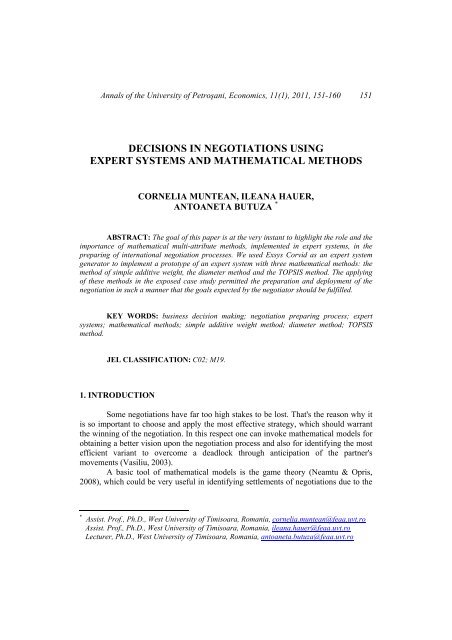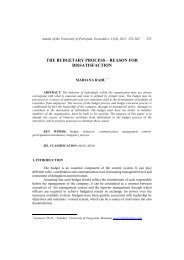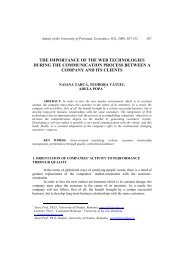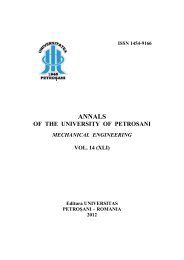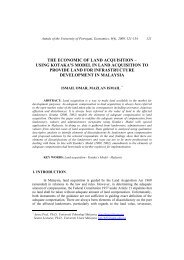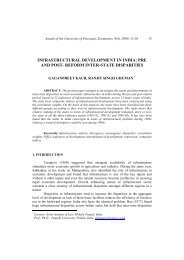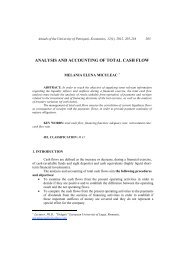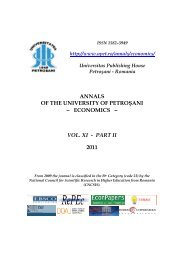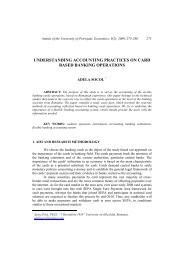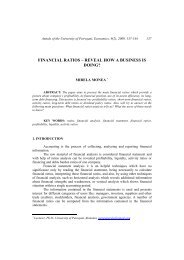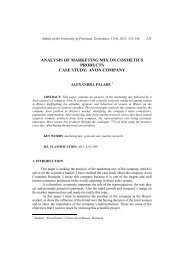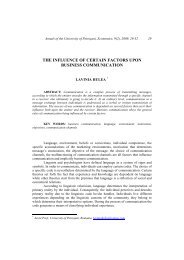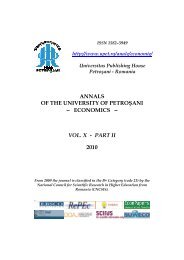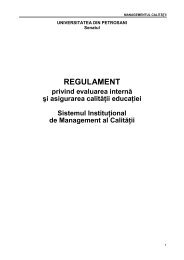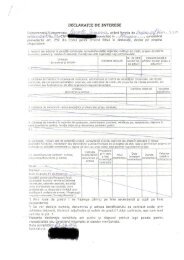annals of the university of petroÅani â¼ economics â¼ vol. xi - part i ...
annals of the university of petroÅani â¼ economics â¼ vol. xi - part i ...
annals of the university of petroÅani â¼ economics â¼ vol. xi - part i ...
You also want an ePaper? Increase the reach of your titles
YUMPU automatically turns print PDFs into web optimized ePapers that Google loves.
Annals <strong>of</strong> <strong>the</strong> University <strong>of</strong> Petroşani, Economics, 11(1), 2011, 151-160 151<br />
DECISIONS IN NEGOTIATIONS USING<br />
EXPERT SYSTEMS AND MATHEMATICAL METHODS<br />
CORNELIA MUNTEAN, ILEANA HAUER,<br />
ANTOANETA BUTUZA *<br />
ABSTRACT: The goal <strong>of</strong> this paper is at <strong>the</strong> very instant to highlight <strong>the</strong> role and <strong>the</strong><br />
importance <strong>of</strong> ma<strong>the</strong>matical multi-attribute methods, implemented in expert systems, in <strong>the</strong><br />
preparing <strong>of</strong> international negotiation processes. We used Exsys Corvid as an expert system<br />
generator to implement a prototype <strong>of</strong> an expert system with three ma<strong>the</strong>matical methods: <strong>the</strong><br />
method <strong>of</strong> simple additive weight, <strong>the</strong> diameter method and <strong>the</strong> TOPSIS method. The applying<br />
<strong>of</strong> <strong>the</strong>se methods in <strong>the</strong> exposed case study permitted <strong>the</strong> preparation and deployment <strong>of</strong> <strong>the</strong><br />
negotiation in such a manner that <strong>the</strong> goals expected by <strong>the</strong> negotiator should be fulfilled.<br />
KEY WORDS: business decision making; negotiation preparing process; expert<br />
systems; ma<strong>the</strong>matical methods; simple additive weight method; diameter method; TOPSIS<br />
method.<br />
JEL CLASSIFICATION: C02; M19.<br />
1. INTRODUCTION<br />
Some negotiations have far too high stakes to be lost. That's <strong>the</strong> reason why it<br />
is so important to choose and apply <strong>the</strong> most effective strategy, which should warrant<br />
<strong>the</strong> winning <strong>of</strong> <strong>the</strong> negotiation. In this respect one can invoke ma<strong>the</strong>matical models for<br />
obtaining a better vision upon <strong>the</strong> negotiation process and also for identifying <strong>the</strong> most<br />
efficient variant to overcome a deadlock through anticipation <strong>of</strong> <strong>the</strong> <strong>part</strong>ner's<br />
movements (Vasiliu, 2003).<br />
A basic tool <strong>of</strong> ma<strong>the</strong>matical models is <strong>the</strong> game <strong>the</strong>ory (Neamtu & Opris,<br />
2008), which could be very useful in identifying settlements <strong>of</strong> negotiations due to <strong>the</strong><br />
* Assist. Pr<strong>of</strong>., Ph.D., West University <strong>of</strong> Timisoara, Romania, cornelia.muntean@feaa.uvt.ro<br />
Assist. Pr<strong>of</strong>., Ph.D., West University <strong>of</strong> Timisoara, Romania, ileana.hauer@feaa.uvt.ro<br />
Lecturer, Ph.D., West University <strong>of</strong> Timisoara, Romania, antoaneta.butuza@feaa.uvt.ro


